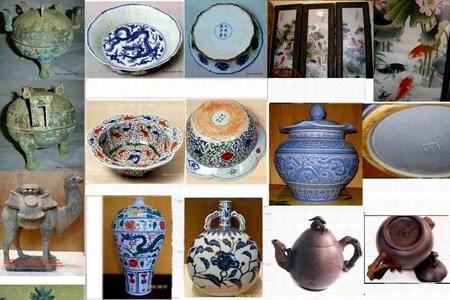(Ecns.cn) – Art investment and collection is often accompanied by high profits and consistently good returns. In recent years, however, numerous replicas and fakes have appeared in China's antique market, giving rise to a corrupt industry comprised of individuals who supposedly have expertise in antique authentication.
Ten such "experts" may arrive at ten different conclusions after they date and test a piece for authenticity, most of which would probably be incorrect. Such ineptitude is considered a major cause of the current mess in the country's antiques market.
Amateur experts?
As authentication of antique Chinese artwork is currently done by visual inspection in most cases – which not only requires a vast knowledge but also many years of experience – many say it is inevitable that green hands will make mistakes.
But this is not the main problem. Some experts only eye rewards from unscrupulous dealers by lying to potential collectors. Using their established reputations, they behave like chameleons and make deliberate false judgments.
It is true that antiques are not only objects of great culture and artistic significance, but also items of immense commercial value. However, their prices are often inconsistent with the actual value, a problem which results from incorrect authentications made by experts.
This is an open secret in China's antique market, said Liu Chao, director-general of the Shanghai Collection Club. Liu noted that some experts have even given different people different assessments of the same antique, only because they were paid with different sums of money.
Such behavior has already disrupted the antique market. Oftentimes investors will be lured to buy modern reproductions once they hear false judgments from experts. In the end, if a buyer purchases a fake piece, they have no choice but to take the loss and chalk it up to experience.
95% of antiques on the market are replicas
Many say it is also because the country has no authoritative agency to identify private cultural relics, so private antique deals are not subject to national antique identification. This results in the wider spread of illegal practices throughout China's antique industry.
As owners of private pieces have no national institution to identify them, they must rely on the word of experienced experts.
Wu Shu, a famous Chinese writer, who is regarded as the "deep throat" of China's antique industry, revealed the incredibly shady world of antique dealing and collecting in the final book of his trilogy about the antiques industry in China.
According to Wu, those involved in the industry neither obey the law nor act reasonably. Through secret investigations, Wu estimated that 95 percent of the antiques on the market today are modern reproductions, and that these fakes belong to 95 percent of the art investors, who have spent 95 percent of their money on them, according to Yangcheng Evening News.
This may be an exaggeration, but it exposes the seriousness of the problem in the country's antique industry. As a result, one must be very careful when selecting for their favorite collection.
Moral principles
Antique authentication is a very complicated, professional and technical procedure. And though scientific methods are available, they are not widely used, partially due to the relatively high costs involved. Scientific analysis can cost more than the item itself, for example.
Under such conditions, the role that experts play is vital in identifying private pieces, but there are no unified standards or criteria for them to refer to. Moreover, the antique market now lacks an efficient and complete system of administration. Government administrative departments only act against those who sell unearthed relics, not fake ones.
In order for the market to develop in a healthier way, a call for moral principles is necessary, as some experts have already been blinded by their greed. Furthermore, the government must enact related laws to crack down on the industry of forgery.
According to Wu Shu's survey, China has over 80 million antique collectors. Experts from the Chinese Academy of Social Sciences have also claimed that nearly 100,000 people are involved in grave robbery, and that more than 2 million graves have been robbed over the past three decades.


















